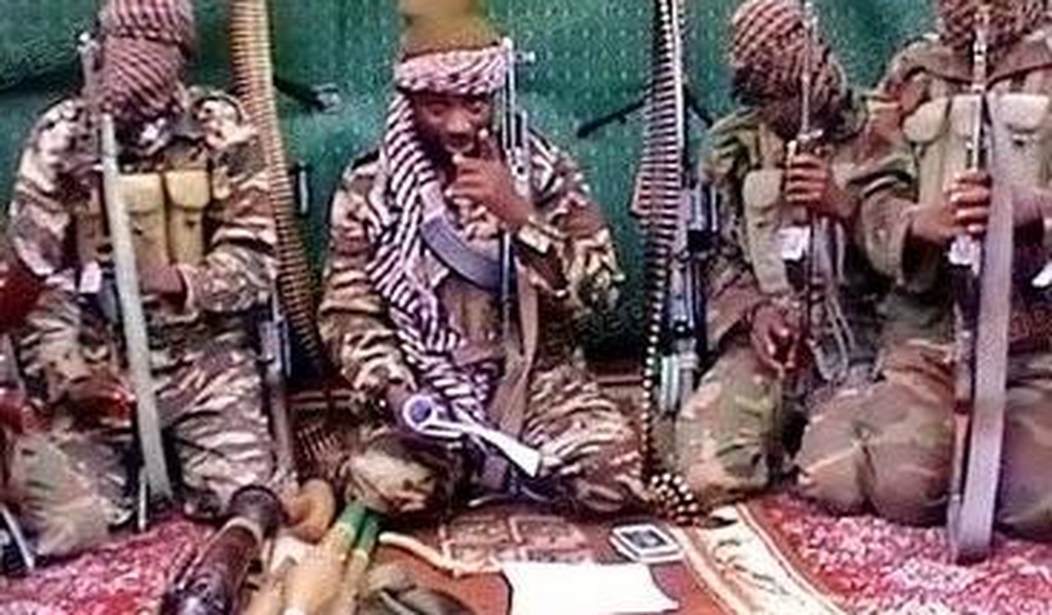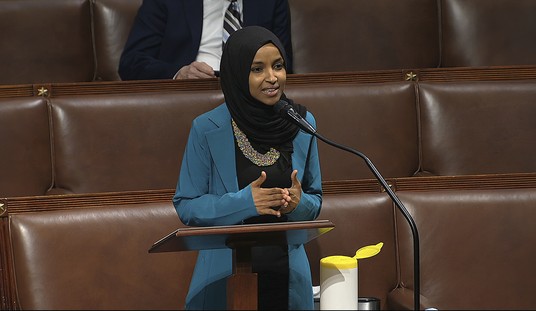Nigerian al-Qaeda affiliate Boko Haram appeared close to its “Mosul moment” today as elders in Borno state reported that the terrorists had surrounded the million-resident capital, Maiduguri.
Reports of the chilling development came just hours after President Obama delivered his speech on his strategy against ISIS that didn’t mention the menacing organization, which has steadily been making gains from the Cameroon border across Nigeria’s northeast, terrorizing civilians along the way and even making some members of the country’s military flee across the border in retreat.
“Over the last several years, we have consistently taken the fight to terrorists who threaten our country,” Obama said. “We took out Osama bin Laden and much of al-Qaeda’s leadership in Afghanistan and Pakistan. We’ve targeted al-Qaeda’s affiliate in Yemen, and recently eliminated the top commander of its affiliate in Somalia.”
Boko Haram was on a steady march through Borno state when it overran Gwoza, a city of about 275,000, declaring on Aug. 24 the town now had “nothing to do with Nigeria” — and declaring it “part of the Islamic caliphate.” Borno is the region where the kidnapping of Chibok schoolgirls in April touched off the #BringBackOurGirls campaign.
The influential Borno Elders Forum, which consists of retired military officials and civilians, reported today that Boko Haram had “completely surrounded the city of Maiduguri.”
“It is apparent that their imminent target is to take the city of Maiduguri, the Borno state capital,” according to the elders’ email published by Nigeria’s Vanguard News.
Boko Haram was founded in Maiduguri as a protest movement in 2002.
Vanguard reported that tens of thousands of Nigerians displaced from other towns seized by the terrorist group have already crowded temporary shelters in Maiduguri.
The elders warned of no less than “the total annihilation of the inhabitants of Borno.”
Nigeria’s military dismissed it an “alarmist report” while adding security “has been upgraded to handle any planned attack or attempt to disrupt the city’s prevailing peace.”
The near-silence from the administration on the Boko Haram advance has been deafening, with no comments from the White House or State Department this week.
At a Friday meeting in Wales with Defense Secretary Chuck Hagel, U.K. Foreign Secretary Philip Hammond, and U.K. Defense Secretary Michael Fallon, Secretary of State John Kerry stressed that they were there to coalition-build against the “ambitious, avowed genocidal, territorial-grabbing, caliphate-desiring, quasi state within a regular army” ISIS.
“And leaving them in some capacity intact anywhere would leave a cancer in place that will ultimately come back to haunt us. So there is no issue in our minds about our determination to build this coalition, go after this,” Kerry said. “When we say holistic, we mean every aspect of this group, and I think this could become conceivably a model that can help us with Boko Haram, could help us with Shabaab, with other groups if we can do this successfully.”
A week ago, State Department spokeswoman Marie Harf said “the U.S. is committed to helping the government of Nigeria address the threat posed by Boko Haram” as Assistant Secretary Linda Thomas-Greenfield was in the country to urge the government “to adopt a comprehensive approach that protects their citizens.”
Harf said Thomas-Greenfield told officials there that “the United States is close to announcing the launch of a major border security program under our Global Security Contingency Fund launched by President Obama during the recent U.S.-Africa Leaders Summit.”
“It will include Nigeria and its neighbors Cameroon, Chad, and Niger,” she said.
“We, obviously, are very concerned about particularly the terrorist group Boko Haram, who has committed terrible abuses against children, including recruiting them and killing them and maiming hundreds of them, and directly targeting schools for attacks.”
Boko Haram began its attacks in 2009 with bombings, assassinations and kidnappings, moving into a guerrilla-style insurgency in 2011. The Obama administration declared Boko Haram a foreign terrorist organization this past November.
The Bama assault put Boko Haram just over 40 miles from Maiduguri, the capital of Borno state with more than a million residents.
UN deputy spokesman Farhan Haq said at a Friday press briefing that “our humanitarian colleagues tell us that they are extremely concerned about the further deterioration of the security situation following the recent attack by Boko Haram on Bama town, which resulted in the displacement of more than 26,000 people.”
“This number is in addition to 1.5 million people displaced since the declaration of a state of emergency in the three northeastern states in May 2013,” Haq added. “Aid agencies report that the number of displaced people in makeshift camps in Maiduguri could be higher than 26,000, since most of Bama’s population of 500,000 has fled the city. Humanitarian partners have called for an urgent response in the areas of protection, health, water and sanitation but access is hampered by the insecurity.”
Nigeria’s Premium Times reported today that thousands of women and children are “dying of thirst and hunger” as Boko Haram tightens its grip on what’s left of Bama, which the Nigerian government said had been liberated by its troops.
“From Monday to date, about 11 days now, Bama, the second largest Local Government Area in Borno, is under the custody and control of the dreaded Boko Haram sect; this is the whole truth and nothing but the truth,” Mohammed Hassan, chairman of the Bama Development Association, told a press conference.
“After 11 days of the invasion and takeover of Bama, no search and rescue operation has been conducted; no damage assessment has been made, even though the security and welfare of citizens is the fundamental and constructional obligation of any meaningful government,” Hassan said, adding that some women and children had drowned in a river while trying to flee “while others were shot dead.”
Community leaders have been getting reports from Bama residents who fled, many on foot, and managed to make it to the capital.
The Nigeria Security Network, a collaboration of security experts and academics, issued a chilling report last week that warned of no less than the severing of Nigeria — with Borno state as Boko Haram’s new “country.”
“If Maiduguri falls, it will be a symbolic and strategic victory unparalleled so far in the conflict,” the group warned.
The report marked July as the point when Boko Haram’s advancements entered “a dangerous new phase” — and the point when the terrorists began “to operate like a conventional army.”
While Boko Haram units outside of the northeast continue to stage “hit-and-run assaults” largely for “psychological effect,” in Borno, Adamawa, and Yobe states they are now “aggressively challenging the Nigerian military through direct confrontation in open and sustained battle,” including the reported use of tanks and artillery.
“If Borno falls to Boko Haram, parts of Yobe and Adamawa can be expected to follow. Parts of Cameroon along the border area would also probably be overrun. Unless swift action is taken, Nigeria could be facing a rapid takeover of a large area of its territory reminiscent of ISIS’s lightning advances in Iraq.”
The fall of Borno state would give Boko Haram’s regional partners and fellow al-Qaeda affiliates a new place to train, along with whatever foreign fighters want to come join the movement. U.S. Africa Command noted in summer 2012 that al-Qaeda in the Islamic Maghreb was inviting Boko Haram and Somalia’s Al-Shabaab to train in an area the size of Texas controlled in northern Mali.
Rep. Trey Gowdy (R-S.C.), chairman of the Select Committee on Benghazi, said in a statement today that “history has shown when America turns a blind eye to terrorism, the terrorists will seize the opportunity to try to blindside us.”
“It is a lesson we learned painfully as a nation in 2001 and again in 2012,” Gowdy said. “As we mark the anniversary of the two 9/11 terrorist attacks, and those who lost their lives, we are reminded of the real cost of terrorism and the importance of remaining vigilant. It should not take the rise of ISIS or Boko Haram or AQAP to force vigilance on the part of our nation and its leaders. And we should not have to relearn the lesson of vigilance every couple of years through the spilled blood of American citizens.”









Join the conversation as a VIP Member